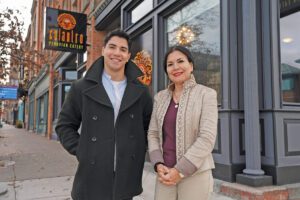“I am from the jungle of Peru,” Betty Shuell shares with a ready smile. She now brings the indigenous flavors and slow-food customs of her native culture to Ann Arbor with Culantro. Her family’s second Peruvian restaurant, it opened December 1 at N. Main and Miller.

Betty Shuell with her son Alvara Herrera at Culantro on N. Main. She had to sell Herrera and her husband, John Shuell, on the project, but their first location in Ferndale flourished, and now they’ve expanded to Ann Arbor. | Photo: J. Adrian Wylie
In several senses, her work exemplifies the rewards of the virtue of patience. “I can never say that Peruvian food, I’m gonna make it in half an hour,” she explains. “My mother went to the market every day to buy the ingredients and cook all morning. We don’t even believe in leftovers.”
Her story includes moving from near Peru’s border with Brazil to the coastal capital, Lima, and becoming a lawyer. Visiting a Michigan friend, she fell in love with the friendly acceptance she found here. “After I went back, I say, ‘This is the country where I want to be and where I want to raise my children,’” she recalls.
Emigrating in 2000 with her then-husband and kids, ages two and four, she realized she’d need to go back to law school to practice here. Instead she pursued an accelerated nursing program at Oakland University and remains a registered psychiatric nurse. The marriage didn’t survive the new environment, and two years later she wed an American, John Shuell.
Cooking to rave reviews from her kids’ playmates’ parents, and noticing the enthusiasm for Peruvian food at a long-ago work lunch at Westland’s Salvation Army, Shuell was inspired to bring the cuisine to southeast Michigan once her children were grown.
Her husband and her son, Alvaro Herrera, were skeptical, but her optimism won the day. The three of them opened Culantro in Ferndale in 2018 while all maintaining full-time day jobs. (Culantro is the Peruvian name for cilantro.) Broad community support, and a business model eschewing full service, got them through the pandemic.
Her daughter Giuliana, now a chemical engineer in Nevada, attended U-M, and Shuell came to appreciate the city’s multicultural character, so she was pleased to find an expansion opportunity in the former Broken Egg space. The build-out took over a year. “Contractors are the same in Peru or here: They take forever!” she says. “People were calling to Ferndale at least fifteen times a day every day asking, ‘When are we open, when are we open?’”
Presumably those impatient customers have already been in to try pollo a la brasa, prepared with a charcoal rotisserie oven imported from Peru. The marinated chicken dish is so popular there that it’s sold at dedicated pollorias, and the third Sunday of July is known as Día del Pollo a la Brasa. A ceviche appetizer of raw fish cured in fresh lime juice is served with sweet potatoes and Peruvian corn, with kernels the size of lima beans, grown in the rich-soiled “sacred valley” of the Andes near Cusco.
The influence of Chinese immigration appears in dishes such as lomo saltado, a marinated beef tenderloin featuring both soy sauce and imported Peruvian peppers, and aji amarillo, served over french fries with white rice on the side. As Shuell explains the multiple starches, “In poor countries, you eat something that’s gonna sustain you for a long time.”
Culantro, 223 N. Main. (734) 369–4302. Mon.–Thurs. 11 a.m.–9 p.m., Fri. & Sat. noon–10 p.m., Sun. noon–9 p.m. culantroperu.com
Culantro and cilantro are two different herbs